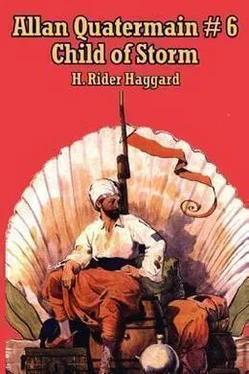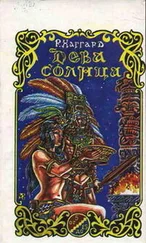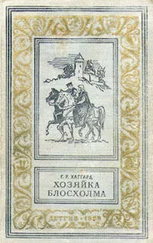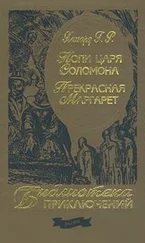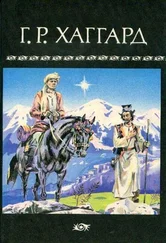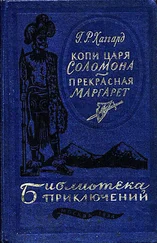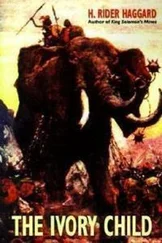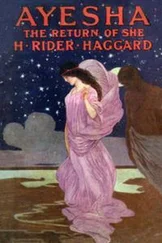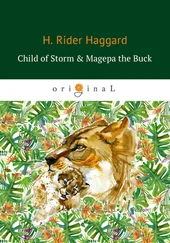It was, I think, in the month of May in the year 1854 that I went hunting in rough country between the White and Black Umvolosi Rivers, by permission of Panda—whom the Boers had made king of Zululand after the defeat and death of Dingaan his brother. The district was very feverish, and for this reason I had entered it in the winter months. There was so much bush that, in the total absence of roads, I thought it wise not to attempt to bring my wagons down, and as no horses would live in that veld I went on foot. My principal companions were a Kafir of mixed origin, called Sikauli, commonly abbreviated into Scowl, the Zulu chief Saduko, and a headman of the Undwandwe blood named Umbezi, at whose kraal on the high land about thirty miles away I left my wagon and certain of my men in charge of the goods and some ivory that I had traded.
This Umbezi was a stout and genial–mannered man of about sixty years of age, and, what is rare among these people, one who loved sport for its own sake. Being aware of his tastes, also that he knew the country and was skilled in finding game, I had promised him a gun if he would accompany me and bring a few hunters. It was a particularly bad gun that had seen much service, and one which had an unpleasing habit of going off at half–cock; but even after he had seen it, and I in my honesty had explained its weaknesses, he jumped at the offer.
"O Macumazana" (that is my native name, often abbreviated into Macumazahn, which means "One who stands out," or as many interpret it, I don't know how, "Watcher–by–Night")—"a gun that goes off sometimes when you do not expect it is much better than no gun at all, and you are a chief with a great heart to promise it to me, for when I own the White Man's weapon I shall be looked up to and feared by everyone between the two rivers."
Now, while he was speaking he handled the gun, that was loaded, observing which I moved behind him. Off it went in due course, its recoil knocking him backwards—for that gun was a devil to kick—and its bullet cutting the top off the ear of one of his wives. The lady fled screaming, leaving a little bit of her ear upon the ground.
"What does it matter?" said Umbezi, as he picked himself up, rubbing his shoulder with a rueful look. "Would that the evil spirit in the gun had cut off her tongue and not her ear! It is the Worn–out–Old–Cow's own fault; she is always peeping into everything like a monkey. Now she will have something to chatter about and leave my things alone for awhile. I thank my ancestral Spirit it was not Mameena, for then her looks would have been spoiled."
"Who is Mameena?" I asked. "Your last wife?"
"No, no, Macumazahn; I wish she were, for then I should have the most beautiful wife in the land. She is my daughter, though not that of the Worn–out–Old–Cow; her mother died when she was born, on the night of the Great Storm. You should ask Saduko there who Mameena is," he added with a broad grin, lifting his head from the gun, which he was examining gingerly, as though he thought it might go off again while unloaded, and nodding towards someone who stood behind him.
I turned, and for the first time saw Saduko, whom I recognised at once as a person quite out of the ordinary run of natives.
He was a tall and magnificently formed young man, who, although his breast was scarred with assegai wounds, showing that he was a warrior, had not yet attained to the honour of the "ring" of polished wax laid over strips of rush bound round with sinew and sewn to the hair, the "isicoco" which at a certain age or dignity, determined by the king, Zulus are allowed to assume. But his face struck me more even than his grace, strength and stature. Undoubtedly it was a very fine face, with little or nothing of the negroid type about it; indeed, he might have been a rather dark–coloured Arab, to which stock he probably threw back. The eyes, too, were large and rather melancholy, and in his reserved, dignified air there was something that showed him to be no common fellow, but one of breeding and intellect.
"Siyakubona" (that is, "we see you," anglice "good morrow") "Saduko," I said, eyeing him curiously. "Tell me, who is Mameena?"
"Inkoosi," he answered in his deep voice, lifting his delicately shaped hand in salutation, a courtesy that pleased me who, after all, was nothing but a white hunter, "Inkoosi, has not her father said that she is his daughter?"
"Aye," answered the jolly old Umbezi, "but what her father has not said is that Saduko is her lover, or, rather, would like to be. Wow! Saduko," he went on, shaking his fat finger at him, "are you mad, man, that you think a girl like that is for you? Give me a hundred cattle, not one less, and I will begin to think of it. Why, you have not ten, and Mameena is my eldest daughter, and must marry a rich man."
"She loves me, O Umbezi," answered Saduko, looking down, "and that is more than cattle."
"For you, perhaps, Saduko, but not for me who am poor and want cows. Also," he added, glancing at him shrewdly, "are you so sure that Mameena loves you though you be such a fine man? Now, I should have thought that whatever her eyes may say, her heart loves no one but herself, and that in the end she will follow her heart and not her eyes. Mameena the beautiful does not seek to be a poor man's wife and do all the hoeing. But bring me the hundred cattle and we will see, for, speaking truth from my heart, if you were a big chief there is no one I should like better as a son–in–law, unless it were Macumazahn here," he said, digging me in the ribs with his elbow, "who would lift up my House on his white back."
Now, at this speech Saduko shifted his feet uneasily; it seemed to me as though he felt there was truth in Umbezi's estimate of his daughter's character. But he only said:
"Cattle can be acquired."
"Or stolen," suggested Umbezi.
"Or taken in war," corrected Saduko. "When I have a hundred head I will hold you to your word, O father of Mameena."
"And then what would you live on, fool, if you gave all your beasts to me? There, there, cease talking wind. Before you have a hundred head of cattle Mameena will have six children who will not call you father. Ah, don't you like that? Are you going away?"
"Yes, I am going," he answered, with a flash of his quiet eyes; "only then let the man whom they do call father beware of Saduko."
"Beware of how you talk, young man," said Umbezi in a grave voice. "Would you travel your father's road? I hope not, for I like you well; but such words are apt to be remembered."
Saduko walked away as though he did not hear.
"Who is he?" I asked.
"One of high blood," answered Umbezi shortly. "He might be a chief to–day had not his father been a plotter and a wizard. Dingaan smelt him out"—and he made a sideways motion with his hand that among the Zulus means much. "Yes, they were killed, almost every one; the chief, his wives, his children and his headmen—every one except Chosa his brother and his son Saduko, whom Zikali the dwarf, the Smeller–out–of–evil–doers, the Ancient, who was old before Senzangakona became a father of kings, hid him. There, that is an evil tale to talk of," and he shivered. "Come, White Man, and doctor that old Cow of mine, or she will give me no peace for months."
So I went to see the Worn–out–Old–Cow—not because I had any particular interest in her, for, to tell the truth, she was a very disagreeable and antique person, the cast–off wife of some chief whom at an unknown date in the past the astute Umbezi had married from motives of policy—but because I hoped to hear more of Miss Mameena, in whom I had become interested.
Entering a large hut, I found the lady so impolitely named "the Old Cow" in a parlous state. There she lay upon the floor, an unpleasant object because of the blood that had escaped from her wound, surrounded by a crowd of other women and of children. At regular intervals she announced that she was dying, and emitted a fearful yell, whereupon all the audience yelled also; in short, the place was a perfect pandemonium.
Читать дальше
Конец ознакомительного отрывка
Купить книгу
